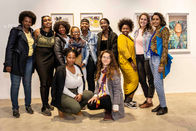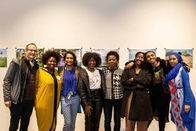Sophie Peters
Sophie Peters

I'm a paragraph. Click here to add your own text and edit me. It's easy.
African Feminisms (Afems) Conference 2019
African Feminisms (Afems) 2019: Theorising from the Epicentres of our Agency
5-7 September 2019, Wits University, Johannesburg
Organised by the Department of Visual Arts, Wits University and the Department of Literary Studies in English, Rhodes University
The third edition of the African Feminisms (Afems) conference occurred from the 5-7 September 2019 at Wits University in Johannesburg, South Africa, in collaboration with the Department of Literary Studies in English, Rhodes University.
The 2019 theme was based on Nigerian Stiwanist Molara Ogundipe’s conversation in 2002 with South African black feminist Desiree Lewis in which Ogundipe states:
For me, social ideas should emerge from a consciousness that thinks of what is beneficial to a human being as a person, not because the ideas occurred or are practiced in Europe or America. We need to overcome our endemic inferiority complex towards Europe and things "white," successfully implanted since our colonial education and through its curricula. We should think from our epicentres of agency, looking for what is meaningful, progressive and useful to us as Africans, as we enrich ourselves with forerunning ideas from all over the world including Europe and America. … I felt that as concerned African women we needed to focus on our areas of concern, socially and geographically. I am concerned with critical and social transformations of a positive nature in Africa, positive meaning, "being concerned with everything that maximises the quality of life of Africans and their potentials too".
Keynote speakers: Patricia McFadden, Kharnita Mohamed, Lynda Gichanda Spencer and Sharlene Khan
Kharnita Mohamed lectures in Social Anthropology at the University of Cape Town. She is working on a PhD in Women’s and Gender Studies at the University of the Western Cape. She has a Masters in Anthropology from the University of Chicago. Her research is focused on disability, race and gender towards developing a conceptual framework for a decolonial feminist disability studies. She was raised on the Cape Flats and is frequently confounded by the contradictions of inhabiting postapartheid South Africa. Her debut novel Called to Song was published by Kwela in 2018.
Patricia McFadden is a Radical African Eco-feminist who aspires to a life of Freedom and Joy. She is vegan and produces most of her own organic food on a mountain in eastern Swaziland. Her most recent publications are ‘Women’s Freedoms are the Heart Beat of Africa’s future: a Sankarian Imperative’ in A Certain Amount of Madness, the life, politics and legacies of Thomas Sankara, 2018; ‘Contemporarity: sufficiency in a Radical African Feminist Life’, in the journal Meridians: feminism, race, transnationalism, 2018.
Lynda Gichanda Spencer is Associate Professor at the Department of Literary Studies in English at Rhodes University and is principal investigator of the UCAPI Research Group, concerned with African popular modes of representation and interpretation, and especially with the ways in which local specificities and global imaginaries are articulated through popular genres. It seeks to engage critically with various knowledge productions that are embedded in local cultural forms.
Sharlene Khan is a visual artist whose multi-media works focus on the socio-political realities of a post-apartheid society and the intersectionality of race-gender-class. She was a recipient of the Rockefeller Bellagio Visual Arts residency (2009), the Canon Collins/Commonwealth Scholarship (2011), the African Humanities Post-doctoral Fellowship (2017), the National Institute for Humanities and Social Sciences Award for Visual Arts (2018) and was runner-up winner in the Videokunst Preis Bremen video art award (2015). She has published three books on her artwork: What I look like, What I feel like (2009), I Make Art (2017) and When the moon waxes red...(2018). She is co-convenor of the annual African Feminisms (Afems) Conference; and runs the NRF-Thuthuka funded Art on our Mind Research Project; the bi-weekly Black Feminist Killjoy Reading Group and the Decolonial AestheSis Creative Lab. She holds a PhD (Arts) from Goldsmiths, University of London and is currently Associate Professor at the Department of Fine Arts, Wits School of the Arts, Wits University, Johannesburg.
Art on our Mind Creative dialogue with South African curator Natasha Becker and dancer-choreographer Mamela Nyamza
Natasha Becker was born in South Africa and has spent the last sixteen years living and working between New York and Cape Town. An expert in contemporary African and African American art, she has curated a number of exhibitions in collaboration with artists, curators, collectors, galleries, museums, and foundations internationally. She recently co-curated two exhibitions, “Perilous Bodies,” and “Radical Love,” at the distinguished Ford Foundation Center for Social Justice to inaugurate their new art gallery in New York (2019). Her past experience includes curating exhibitions at the Goodman Gallery (South Africa), convening public programs in global art history at the Clark Art Institute, and launching an international video art festival (both Massachusetts, USA). Natasha is one of the co-founders of two collaborative curatorial platforms, ASSEMBLY ROOM (New York) and THE UNDERLINE SHOW (Johannesburg).
Mamela Nyamza (born and raised in Gugulethu, Cape Town) trained in dance at the Zama Dance School under the Royal Academy of Dance (Cape Town, South Africa). She furthered her studies at Pretoria Dance Technikon where she obtained a National Diploma in Ballet (Pretoria, South Africa). In 1998 she received a scholarship to study dance at the Alvin Ailey Dance Theatre (New York, USA). Thereafter, she joined the State Theatre Dance Company (South Africa) and participated in national and international performances. Nyamza also attended choreography workshops at the Vienna International Dance Festival. She also received ballet training from Martin Schonberg at the Pact Dance Company (Pretoria, South Africa), attended African Dance workshops by Jamaine Acogny (Soweto, South Africa), and studied a dance course at Sadler’s Wells Theatre (London, United Kingdom). She also focuses on socio-political themes such as violence, rape and lesbian identity. She recently returned from Edinburgh, UK, as one of the delegates from South Africa for the Edinburgh Theatre and Dance showcase under the British Council. Awards include: Standard Bank Young Artist Award in Dance (2011), Featured Artist in Dance at the National Arts Festival (2018), Mbokodo in Dance (2016), GLAMOUR creative women, among others. She is now based at the South African State Theatre as a Deputy Artistic Director, and some of her mandate is Curator for Dance Umbrella Africa, VAVASATI and 16 Days of Activism at The South African State Theatre. She interrogates the dance medium of classical ballet and challenges the conventions for traditional dance norms taught in formal dance education and is skilled in multiple dance forms such as: modern dance, African dance, the Horton technique, Spanish dance, jazz movement, mime, flying low technique, release technique, gumboot dance, Butoh and many more. Select solo and group performances include De-Apart-Hate at Johannesburg Dance Umbrella (Johannesburg, South Africa, 2017), Hatched (Johannesburg, France, Germany, Singapore, Egypt, Cairo, Mali, Tchad, USA, and UK’s Dance Umbrella, 2011; Infecting the City, Cape Town, 2013), I Stand Corrected, in collaboration with UK-based artist Mojisola Adebayo at the Ovalhouse (London, United Kingdom, 2012) and later at the Soweto Theatre, South Africa; Isingqala and Amafongkong, collaborative productions with the Adugna Dance Theatre Company (Ethiopia) at the National Arts Festival (Grahamstown, South Africa, 2011), and African Footprints (2006). Her latest work Black Privilege is still on demand internationally and nationally.
See you at Afems 2021 at The University of Cape Town!
2019 UCAPI and Art on our Mind teams
Thanks
Afems 2019 would not have been possible without volunteer work and institutional support.
Funders and donors:
Urban Connections in African Popular Imaginaries (UCAPI); Art on our Mind; NRF Thuthuka Grant; Wits University; Wits School of the Arts; Prof Rosemary J. Jolly, Weiss Chair of the Humanities, Penn State University; Arts Research Africa; Rhodes Office of Equity and Institutional Culture; Janice Scheckter; Prof Dina Ligaga, Dr Derilene Marco, Fouad Asfour and every single Afems participant and audience member who paid registration fees!
Thanks go also to:
Prof Dina Ligaga and Dr Derilene Marco from the Department of Media Studies; Prof Rosemary J. Jolly; Prof David Andrew, Head of the Fine Art Department; Prof Brett Pyper, Head of the Wits School of the Arts; Prof Christo Doherty and Zanele Madiba from the Arts Research Africa Programme; Merle Govind; Shireen Rubenstein; Prof Bhekizizwe Peterson; Valerie Killan; Wits School of the Arts staff including Tandolwetu Yokwana, Reshma Chhiba, Londiwe Langa; Beverley Batohi, Hlomohang Mothetho, Lerato Sekele, Emanuel Sibisi, Thandi Kente, Emma Ketzie, Samuel Ravengai, Daniel Gray, Godfrey Mahlangu, Akona Kenqu; Zodwa Tutani-Skeyi; Katty Vandenberghe; Crystal Wilton; Mandlakazi Zilwa, Mosa Kaiser; Mia Louw; Ms Noluxolo Nhlapo; Office of the Vice-Chancellor of Rhodes University; Katlego Gabashane; Rhodes Department of Literary Studies staff including Prof Dirk Klopper (Acting HoD), Siphokazi Khanyile, Tarryn Gillitt, Jiba Xulu, Tammy Youthed; the UCAPI Squad!!!: Ashton Kirsten, Doseline Kiguru, Tahzeeb Akram, Jon Wilson, Amol Awour, Melissa Fuhner, Manoko Thlako, Noluthando Mpho Sibisi.
A special shout out to the 2019 Art on our Mind team who worked for months to make Afems a reality: Fouad Asfour, Lebohang Kganye, Saajidah Madhi, Tammi Mbambo, Sihle Motsa, Kundai Moyo, Nadia Myburgh.
Thank you to all our keynotes, panellists, creatives, various contributors and volunteers – without you there is no Afems. Thank you for your intellectual and spiritual generosity which makes Afems a one-of-a-kind event.
For more information, please contact Prof Khan or Prof Spencer on afrifems17@gmail.com

























